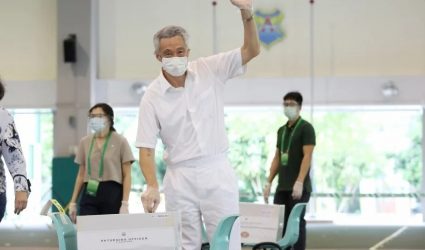Singapore’s PAP retains power but support slips as opposition make historic gains

(The Star) – Singapore’s long-ruling party retained power on Saturday but its support fell sharply, while the opposition made historic gains, in a general election held under the shadow of a coronavirus outbreak.
Voters put on masks and gloves and had to observe social distancing rules during a poll held as the city-state emerges from a lengthy lockdown.
The affluent financial hub has seen large virus outbreaks in dormitories housing low-paid foreign workers, but with new infections slowing and authorities easing a partial lockdown the government pushed ahead with the poll.
The People’s Action Party, which has ruled Singapore for six decades, was always assured of victory, and it won 83 of 93 parliamentary seats up for grabs, and 61.2 percent of the popular vote.
But that was pointedly down on the nearly 70 percent of the vote it won at the country’s last election in 2015, while the opposition Workers’ Party picked up 10 seats — its best ever showing at an election.
The PAP “will have to do some significant soul-searching,” Eugene Tan, political analyst from Singapore Management University, told broadcaster CNA.
“They really need to examine what has contributed to this performance.”
Prime Minister Lee Hsien Loong retained his seat, but saw his share of the vote slip.
“I think the prime minister will be somewhat disappointed because he has fought this election asking for a strong mandate, and I wonder whether the voters have shown some reservations,” said Tan.
While the PAP’s results might be welcome for many governments around the world, the party that has been totally dominant since independence in 1965 is likely to be unhappy.
And for the Workers’ Party, which previously held six seats, the results felt like a victory. Raucous celebrations erupted in one of the party’s strongholds, with people cheering and waving flags.
“We hope for a better five years, for the future of Singapore,” one supporter, Manuel, told AFP.
Friday’s voting had been marred after long queues formed outside polling stations due to the need to undergo virus checks, prompting election officials to extend voting by two hours.
Opposition groups reacted furiously, with the Singapore Democratic Party calling it “highly irregular”, adding that some of their polling agents had to leave before voting ended.
Prime Minister Lee, in charge since 2004 but now likely heading for his final term as premier, had repeatedly called Covid-19 “the crisis of a generation” and sought to project his party as a force for stability.
The trading hub has been hit hard by the pandemic and is forecast to be heading for its worst recession since independence in 1965.
But his message did not resonate with voters, while the opposition received a boost after they were joined by Premier Lee’s estranged brother, Lee Hsien Yang.
The sibling is locked in a long-running feud with the prime minister over the legacy of their father, Singapore’s late founding leader Lee Kuan Yew, and has become a member of the Progress Singapore Party, although he did not run for office himself.
His party was among a host of opposition groups taking on the PAP.
The PAP, which oversaw Singapore’s transformation into one of the world’s wealthiest societies, enjoys solid support but has been accused of arrogance, gerrymandering and targeting its rivals.
During the campaign, several media outlets were hit with a controversial law against misinformation after carrying comments made by an opposition figure on the virus outbreak.
They were ordered to place warnings next to the comments, saying they contained false information.
Job security and the government’s response to the pandemic have been key topics among voters.
After initially keeping the virus in check, Singapore saw major outbreaks in the foreign worker dorms. It has reported more than 45,000 infections, including 26 deaths, and is slowly emerging from a two-month lockdown.
The poll is also a step in a carefully orchestrated transition of power to a new generation of leaders, with the prime minister expected to hand over to a hand-picked successor at some point afterwards.

